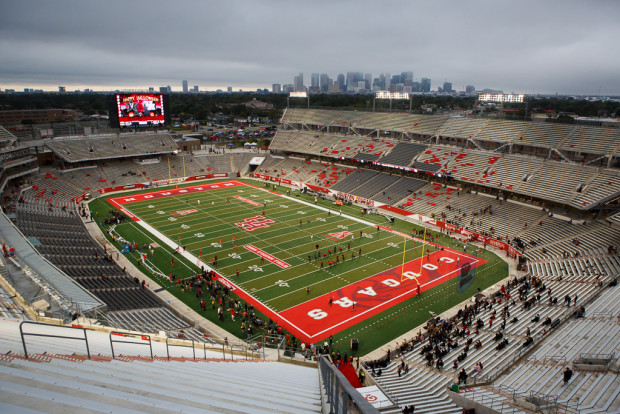The Big 12 will likely expand, following the departure of Oklahoma and Texas to the Southeastern Conference (SEC). The top three candidates appear to be Brigham Young University (BYU), the University of Cincinnati, and the University of Central Florida (UCF), all without much argument or disagreement, even with BYU’s religious drawbacks. The fourth option appears to be much more controversial, and that fourth option is the University of Houston Cougars.
The case for Houston appears to be mixed, with numerous positive merits and others far more negative:
Pros
Fourth Largest Metropolitan Area in America
The University of Houston is located in the fourth largest metropolitan area in the United States, with over 7 million residents in the area. The city continues to grow, while many other areas of the conference are forecasted to plateau or decline, per 2020 census projections. (Iowans and Kansans may not want to look at these numbers). On average, the City of Houston adds 250 people per day.
Rapidly Growing Institution
The former commuter school has not only increased its presence within the city as a prominent university, but the university has also enhanced its academic prowess within the State of Texas and beyond. UH earned a top 50 ranking as a “Top Performer for Social Mobility,” and also landed on the lists for “Top Public Schools” and “Best Value Schools.” Development around the university has also made the institution more desirable to live on or near campus for a college experience beyond commuting to class. Football and basketball facilities have been greatly improved over the previous decade with philanthropic support.
Successful teams
The University of Houston has seen great success with coaches including Art Briles, Kevin Sumlin and Tom Herman. The Cougars captured America’s eye on a bigger stage in 2015 with a Peach Bowl win over Florida State, and in 2016 with a win over the Oklahoma Sooners in NRG Stadium. The 2021 Houston Cougars reached the Final Four in Indianapolis under Kelvin Sampson.
Recruiting Territory
The Big 12 losing the University of Texas hurts recruiting, especially in the lower parts of the state of Texas. Adding Houston regains the metro area in the Big 12’s recruiting footprint. In 2016, former Oklahoma Head Coach Barry Switzer remarked on Houston recruiting: “I always said if I could get the top 30 players coming out of Houston every year, I’d play for the national championship every year.” More on this topic below.
Cons
Pro Sports Town
The University of Houston is located within ten miles of NRG Stadium, home of the NFL’s Houston Texans, Minute Maid Park, home of MLB’s Houston Astros, and Toyota Center, home of the NBA’s Houston Rockets. City schools with large pro sports presences routinely struggle to fill stands and command television viewership. Drawing crowds has proven challenging for the University of Houston as many teams and franchises compete for sports fans.
Texas, Texas A&M and LSU
Three current and future SEC programs have large alumni bases in the Houston Metropolitan Area, and will likely continue that trend into the future. When Houston is good, they can command viewership in the metropolitan area, but can they always be good enough to shine brightly through the bright SEC lights now over Houston?
Tilman Fertitta
University of Houston Board Chairman Tilman Fertitta is an American billionaire businessman and television personality. He is the chairman, CEO, and owner of Landry’s, Inc. He also owns the National Basketball Association’s Houston Rockets. In 2018, his net worth was estimated at $4.5 billion. In 2016 when the Big 12 explored but decided not to expand, Fertitta loudly berated numerous existing institutions within the conference, of which some may not have forgiven or forgotten. The league remains reluctant to add Houston due to Fertitta.
Coach Retention
Houston has had five head football coaches in the last decade. With many good teams at the mid-major level, the University of Houston also has had a coach retention problem. Art Briles, Kevin Sumlin and Tom Herman all bolted the institution for greener pastures in the Big 12 and SEC. In the new Big 12, will bigger names still be able to poach any coach from Houston who finds success?
Recruiting Territory
As noted above, Houston has some of the top recruiting talents in the nation. Having a school down the street instead of up the road should have Baylor, Oklahoma State, TCU and Texas Tech concerned, who all heavily recruit Houston. Currently, those schools have an advantage over Houston due to Big 12 membership. Does that talent stay in town with Houston at those schools level?
Sleeping giant or afterthought?
The case for Houston isn’t as cut and dry as BYU, Cincinnati and Central Florida. Other schools such as Boise State or Memphis could make a better case for membership over Houston, based upon the cons listed above. Many view the University of Houston as a sleeping giant, given the size of the city and growth of the school. Would that be more of a blessing or a curse? Having a strong institution in a major city like Houston could be of great value to the Big 12 Conference, but is it worth having Houston at the expense of other existing members? Would the University of Houston be able to overcome the large shadows cast by the Longhorns, Aggies, Texans and Astros? Time will ultimately tell, but the decision to add or leave Houston is not an easy one.

